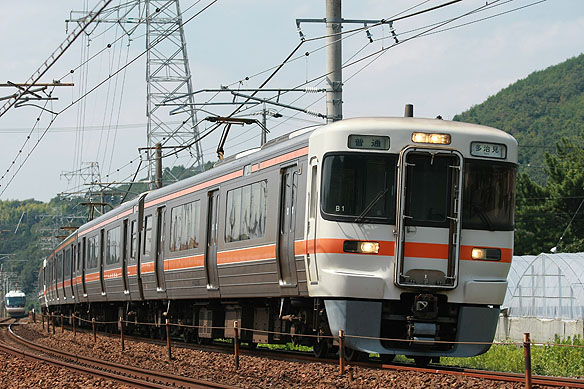Background and overview
313-1000 series suburban DC electric multiple unit (EMU) trains built for
Chuo rapid and ordinary services are 4-car sets consisting of 2 powered
vehicles and 2 trailer vehicles. 313-1000 series can be operated coupled
with 211 series EMU together. Three 4-car sets were delivered in 1999.
Car body
They have 2930mm wide body, incorporating light weight stainless construction.
Their pier panels (strength members) are also gotten rid of to match various
seating arrangements. Their bodies are unpainted and have the orange waistline
and headline bands running through the length of each car below and above
the windows. Their gangwayed cab end section painted in white is constructed
by steel. They are equipped with three 1300mm wide double-leaf automatic
sliding doors on each side of the vehicles. Horizontal band of 5 set fixed
windows having 930mm height are fitted between the doors and hopper windows
are at the end of their body. Double-glazing UV cut glass is employed for
all windows to improve noise insulation property and to prevent dew condensation.
Traditional destination rollsigns are fitted on the side of their body
and a destination rollsign and a train-type rollsign are fitted at the
front of end vehicles. Two air conditioners, C-AU714A, rated at 21,000kcal/h/unit,
and no ventilators are fitted on their roof. Loudspeakers, providing guidance
broadcast for passengers waiting at a station, are fitted on their roof.
End cars are equipped with the automatic jumper coupler to ease rush-up
operations.
Bogies
Motored bogies are C-DT63A and trailer bogies are C-TR251, featuring bolster-less
secondary air suspension, corn-shaped multilayered rubber spring journal
supporting system, and the single link traction device. The lateral distance
between secondary air suspensions is 20mm wider than that of 373 series
and the yaw dampers are adopted to ensure smooth ride characteristics even
at 120km/h. Twin Disc (TD) flexible joint employing deflecting plates made
of carbon-fiber reinforced plastic (CFRP) is applied for power transmission
device. Motored bogies employ the single tread brake device adopting automatic
gap-adjusting unit, and trailer bogies employ both the double disk brake
device and the wheel tread cleaning device.
Traction unit and ancillary equipments
Their powered end vehicles, class kumoha313-1000, are equipped with a 3-step
Variable-frequency drive (VFD) traction system, C-CS37, featuring Insulated
Gate Bipolar Transistor (IGBT) and controlling four asynchronous traction
motors, C-MT66A, with a power output of 185kW on truck basis. This traction
system is integrated with the auxiliary power supply unit with a power
output of 150kVA. In case of the auxiliary power supply unit failure, one
VFD unit for traction motor drive can switch to supply electricity as the
backup auxiliary power supply unit. On the other hand, powered intermediate
vehicles, class moha313-1000, are equipped with a traction system, C-CS38G1,
controlling four traction motors. Powered vehicles are also equipped with
a single arm type current pickup, C-PS27A, on their roof. Trailer end vehicles
are equipped with a motor driven air compressor, C-C2000ML, under their
floor. 313-1000 series feature the electric commanding brake with regenerative
brake and holding brake, featuring brake control of trailer priority.
Accommodation
Seating accommodation consists of 2+2 abreast switchable transverse seating
with 875mm seating pitch with movable headrest keeping upright, transverse
bucket seating bays next to the doorway, and longitudinal seating at the
end of the passenger saloon. They adopt free stop roller blinds. An AC
duct is installed above the ceiling and slit-shaped AC vents are featured
in order to improve interior design. A LED display for providing passenger
information, and a door chime are fitted above the door header of the sliding
doors. Straps were fitted throughout their body. Trailer end cars, class
kuha312-0, are equipped with a universal access style toilet employing
a chemical holding tank.
Operations
313-1000 series have been used on rapid and ordinary services of Chuo line
between Nagoya and Nakatsugawa, and Kansai line between Nagoya and Kameyama
from 1999. |
|
|
